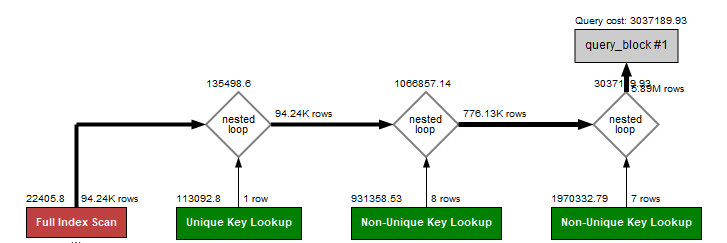I have the following tables: in a MySQL 5 database:
projects- 1,000 rowstasks(FKed toprojects) - 10,000 rowstask_tags(FKed totasks) - 350,000 rowstask_comments(FKed totasks) - 750,000 rows
and want to get a list of projects for which any task has exactly the word urgent in a tag or comment, i.e.
select DISTINCT p.*
from projects p
join tasks t on p.id = t.project_id
left join task_tags tt on t.id = tt.task_id
left join task_comments tc on t.id = tc.task_id
where tt.value = 'urgent' OR tc.text = 'urgent'
Without the DISTINCT, the query executes in well under 0.1 second (and the indices used look sensible). The Visual Execution Plan is (with the tables being projects, tasks, task_tags and task_comments in that order from left to right):
Adding the DISTINCT makes the query seriously unperformant (on the order of minutes), with the DISTINCT being added on after the last nested loop, and thus I believe requiring MySQL to sort all the resulting rows, and then deduplicate them.
While this is correct, it does not feel like the best possible option--after all, once we know that a project meets the criteria, there is no point checking any other tasks for that project as this isn't e.g. select distinct p.*, t.id - but I don't know how to encourage MySQL to plan this more sensibly because I don't know what plan I want.
I have tried something along the lines of
select distinct project_id
from tasks
where id in (
select task_id from task_tags where value = 'urgent'
union
select task_id from task_comments where text = 'urgent'
)
as an alternative but we are also on the order of minutes for that though I believe it is slightly faster, and I have no other great ideas (except for things not in MySQL 5 like persisted views, but upgrading the DB is not a practical option at this stage).
Any ideas as to what I could try (or even where to investigate next)? The database model is fairly fixed, but certainly I can add indices and happy to look at options.


OPTIMIZE TABLE...? Otherwise a very decent first question. Good luck.union allor as anor